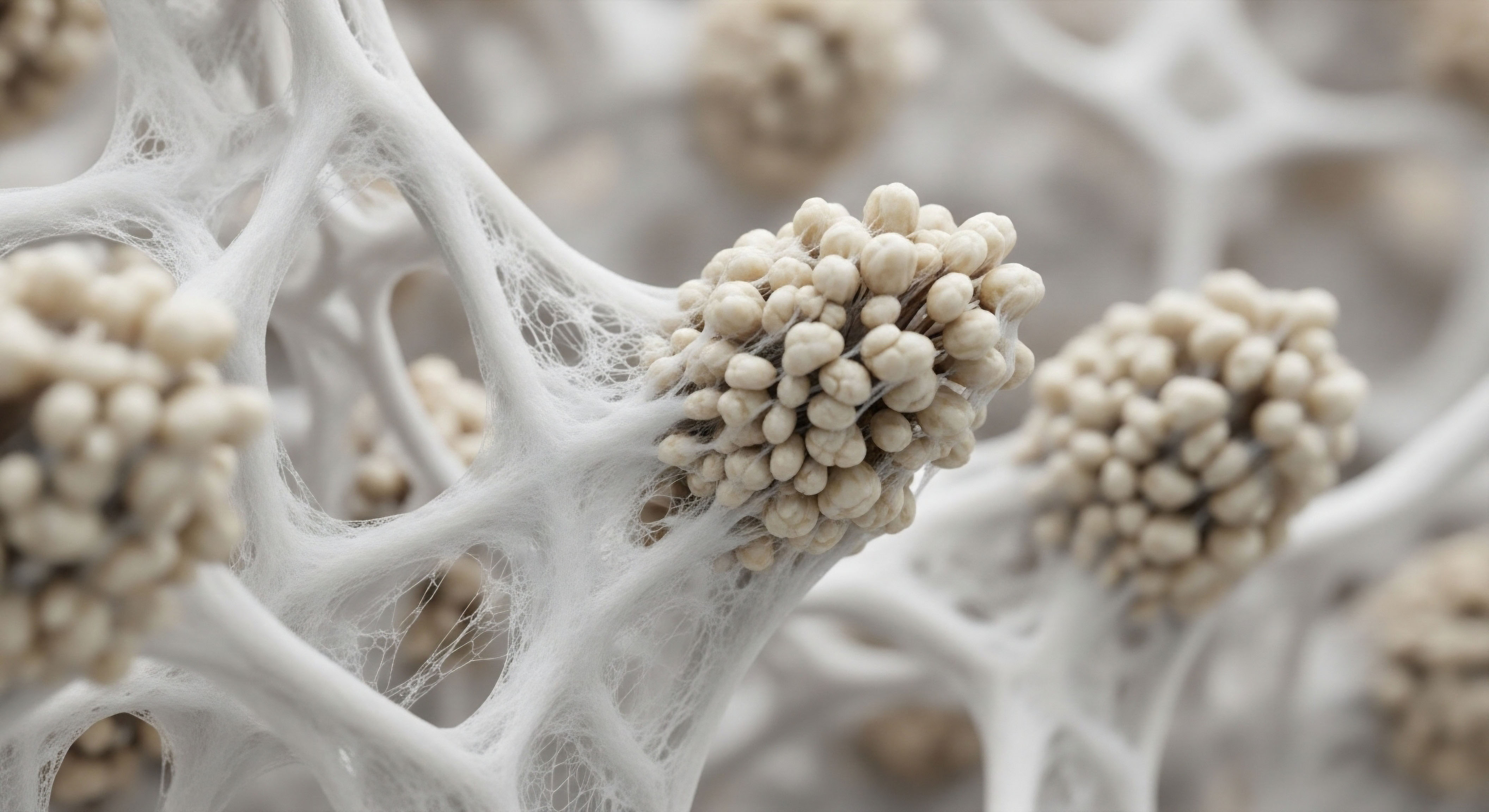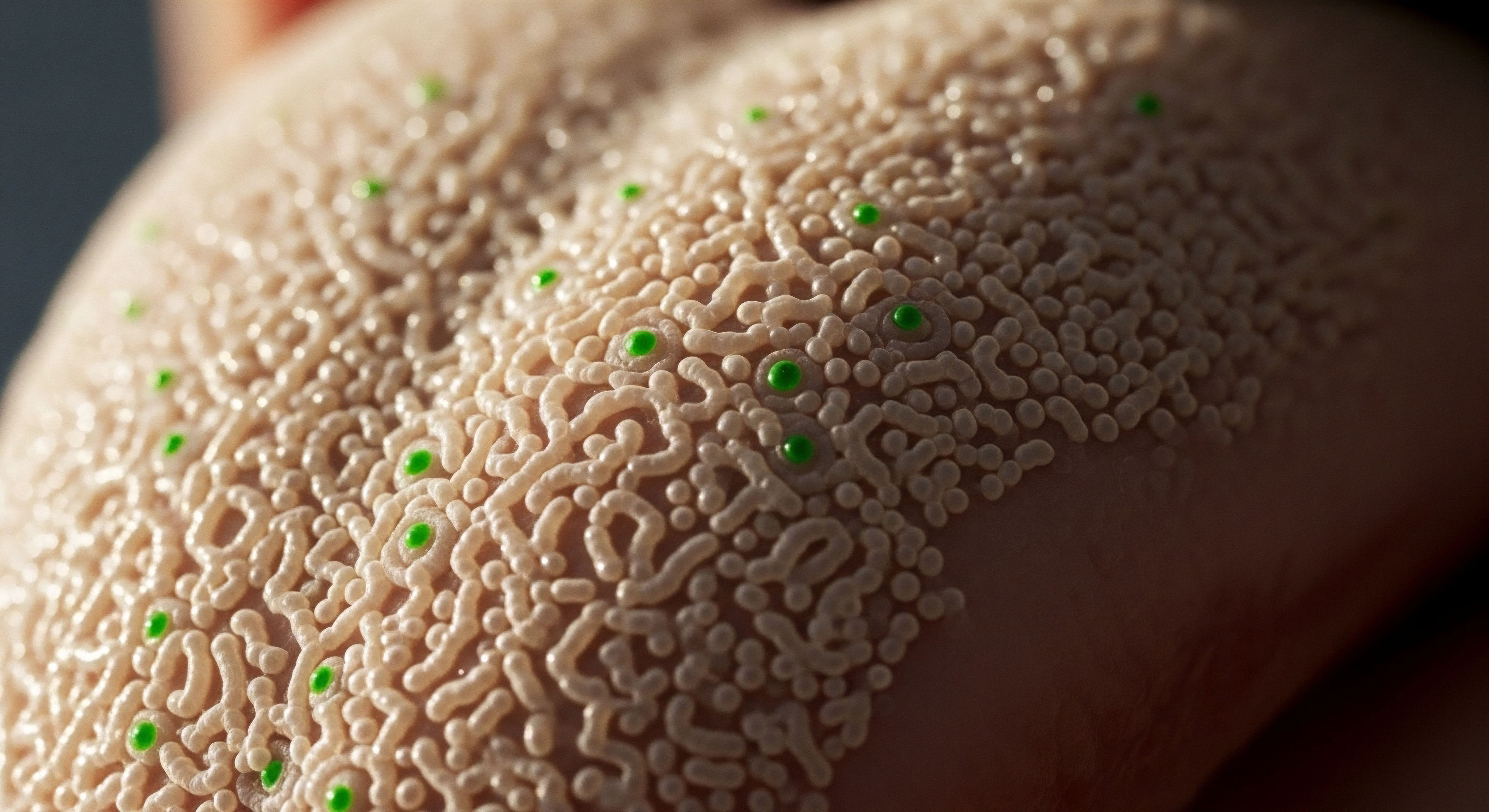

Fundamentals
You may have felt it as a subtle shift in the clarity of your thoughts, a frustrating search for a word that was once readily available, or the unsettling frequency of misplacing your keys. This experience of cognitive change is a deeply personal and often disquieting part of the human condition, particularly as we move through life’s biological chapters.
Your brain, the very seat of your identity and consciousness, is an exquisitely sensitive organ. Its function is profoundly tied to the symphony of chemical messengers that govern your body’s internal landscape. These messengers, your hormones, are the conductors of this intricate orchestra, and their fluctuations are felt directly within the neural circuits that create your reality.
The brain is a primary target for the body’s main steroid hormones. Receptors for testosterone, estradiol, and progesterone are densely populated in areas critical for higher-order thinking, memory formation, and emotional regulation, such as the hippocampus and prefrontal cortex. These hormones are fundamental architects of your cognitive world.
They modulate the production and release of neurotransmitters, the chemical signals that allow neurons to communicate. They support synaptic plasticity, the very basis of learning and memory. They also ensure healthy blood flow, delivering the oxygen and nutrients required for the brain’s immense metabolic activity. When the levels of these hormones decline or become imbalanced, the fidelity of these signals can weaken, leading to the subjective feeling of ‘brain fog’ or diminished mental acuity.

How Does the Brain Listen to Hormones?
The relationship between your hormones and your brain is a dynamic conversation. Hormones bind to specific receptors within brain cells, initiating a cascade of events that can alter gene expression and cellular function. Think of it as a key fitting into a lock.
When the right hormonal key enters the lock on a neuron, it opens a door to a specific set of instructions. Estradiol, for instance, is a powerful supporter of neuronal growth and survival. It encourages the formation of new synaptic connections and has a direct influence on the production of acetylcholine, a neurotransmitter vital for memory and learning.
Testosterone, while often associated with male physiology, plays a critical role in both men and women by supporting dopamine pathways, which are linked to motivation, focus, and executive function. Progesterone and its metabolites interact with GABA receptors, the primary inhibitory system in the brain, which helps to promote calmness and regulate mood.
The brain is not merely affected by hormones; it is fundamentally built to run on their signals.
Understanding this biological reality is the first step toward reclaiming your cognitive vitality. The symptoms you experience are valid and have a physiological basis. They are signals from your body’s control system indicating a shift in its internal environment. This perspective moves the conversation from one of passive acceptance of decline to one of proactive investigation and potential recalibration.
The goal of a personalized wellness protocol is to restore the clarity of these internal signals, allowing your brain to function with the precision and energy it is designed to possess.
- Testosterone ∞ In both men and women, this hormone is integral to maintaining spatial abilities, verbal memory, and analytical reasoning. Its decline can be linked to a reduction in mental assertiveness and focus.
- Estradiol ∞ A key player in female cognitive health, estradiol supports verbal fluency, fine motor skills, and the speed of information processing. Its fluctuations during perimenopause are often directly correlated with memory lapses.
- Progesterone ∞ This hormone has a calming, almost sedative effect on the brain, which can aid in sleep quality. Restorative sleep is itself a cornerstone of cognitive function, allowing for memory consolidation and cellular repair.
The journey to hormonal balance begins with recognizing that your cognitive state is a reflection of your underlying physiology. The path forward involves a careful, evidence-based approach to understanding your unique hormonal signature and developing a strategy to support its optimal function. This is a process of biological restoration, aimed at providing your brain with the resources it needs to operate at its peak potential, ensuring that your mental clarity and sharpness are preserved and enhanced.


Intermediate
Moving from the recognition of hormonal influence on cognition to the application of clinical protocols requires a shift in perspective. We are now entering the realm of targeted intervention, where the goal is to systematically restore the biochemical environment that supports optimal brain function.
Hormonal optimization protocols are designed with a deep understanding of the body’s feedback loops, specifically the Hypothalamic-Pituitary-Gonadal (HPG) axis. This intricate system governs the production of sex hormones, and a well-designed protocol works with this axis, not against it, to re-establish a physiological balance that may have been lost due to age or other factors.
For men experiencing the effects of andropause, a standard protocol often involves Testosterone Replacement Therapy (TRT). A typical regimen might include weekly intramuscular injections of Testosterone Cypionate. This directly replenishes the primary male androgen, addressing the root cause of symptoms like cognitive lethargy and reduced motivation.
The protocol is more sophisticated than simply adding testosterone. It often includes Gonadorelin, a peptide that mimics Gonadotropin-Releasing Hormone (GnRH). The inclusion of Gonadorelin stimulates the pituitary gland to produce Luteinizing Hormone (LH) and Follicle-Stimulating Hormone (FSH), thereby maintaining the natural function of the testes and preventing testicular atrophy.
Furthermore, Anastrozole, an aromatase inhibitor, may be used to carefully manage the conversion of testosterone to estrogen, as an improper ratio can lead to its own set of side effects and sub-optimal cognitive outcomes.

Which Cognitive Functions Improve with Treatment?
The efficacy of these protocols is measured through both subjective feedback and objective testing. The patient’s reported sense of well-being, mental clarity, and focus is a primary indicator. This subjective experience is then correlated with objective data from standardized cognitive assessments. These tests provide a baseline measurement of cognitive function before the protocol begins and are repeated at intervals to track progress. The improvements are often seen in specific domains that are highly sensitive to hormonal influence.
A successful hormonal protocol translates directly into measurable improvements in cognitive performance and a renewed sense of mental sharpness.
For women, hormonal protocols are tailored to their specific life stage, whether perimenopausal, post-menopausal, or experiencing other hormonal imbalances. A protocol for a post-menopausal woman might involve low-dose Testosterone Cypionate administered subcutaneously, which can have a significant impact on drive, mood, and mental energy.
This is often complemented with Progesterone, which supports sleep architecture and provides a calming counterbalance. The method of delivery is also a key consideration, with options ranging from injections to long-acting pellet therapy, chosen based on the patient’s lifestyle and metabolic needs. The goal is to recreate a hormonal environment that is protective of cognitive health, mitigating the neurobiological impact of menopause.
| Cognitive Domain | Description | Example Assessment Tool |
|---|---|---|
| Verbal Memory | The ability to encode, store, and retrieve information presented verbally. This is often affected by fluctuations in estradiol. | Rey Auditory Verbal Learning Test (RAVLT) |
| Executive Function | A set of higher-order mental processes that includes planning, decision-making, working memory, and cognitive flexibility. Strongly influenced by testosterone and dopamine pathways. | Stroop Color and Word Test |
| Processing Speed | The speed at which an individual can perceive, process, and respond to information. | Digit Symbol Substitution Test (DSST) |
| Visuospatial Ability | The capacity to understand and remember spatial relations among objects. | Benton Judgment of Line Orientation |
The success of these interventions hinges on a continuous feedback loop between the patient’s experience, laboratory testing of hormone levels, and objective cognitive measurements. This data-driven approach allows for precise adjustments to the protocol. For instance, if a male patient on TRT reports persistent brain fog despite having testosterone levels in the optimal range, a clinician might investigate his estradiol levels.
If they are elevated, a slight adjustment in the Anastrozole dosage could be the key to unlocking the desired cognitive benefits. This level of personalization is what defines modern hormonal optimization, moving it far beyond a one-size-fits-all approach. It is a collaborative process of biochemical recalibration aimed at restoring the brain’s intended operational capacity.


Academic
The evaluation of hormonal protocol efficacy is evolving toward a highly sophisticated, multi-modal framework that integrates subjective reporting with objective, quantifiable biological markers. While standardized cognitive testing provides a crucial measure of functional output, a deeper analysis requires us to probe the underlying neurophysiological changes that drive these improvements.
At this academic level of inquiry, we are examining the direct impact of hormonal interventions on brain structure, function, and its biochemical milieu. This pursuit leads us to the frontier of cognitive biomarkers, where we can visualize and measure the tangible effects of endocrine recalibration on the central nervous system.

Can We Predict Cognitive Response before Starting Therapy?
One of the most powerful tools in this domain is functional neuroimaging. Functional Magnetic Resonance Imaging (fMRI) allows us to observe changes in cerebral blood flow and neuronal activity in real-time.
Studies utilizing fMRI in individuals undergoing hormone therapy can reveal increased activation in the prefrontal cortex during executive function tasks or enhanced connectivity within the default mode network, which is associated with memory consolidation and introspection.
Positron Emission Tomography (PET) scans offer another layer of insight, capable of tracking metabolic activity using a radiotracer like FDG or imaging the deposition of pathological proteins like amyloid-beta and tau. Research has suggested that appropriately timed hormone therapy may be associated with lower levels of these Alzheimer’s-related biomarkers, providing a potential neuroprotective mechanism that can be directly visualized.
These imaging techniques provide concrete, anatomical evidence of a protocol’s efficacy, moving beyond behavioral observation to structural and functional restoration.
Beyond imaging, the analysis of biochemical markers in serum and cerebrospinal fluid (CSF) offers a granular view of the brain’s molecular environment. One of the most significant of these is Brain-Derived Neurotrophic Factor (BDNF), a protein that is essential for neurogenesis, synaptic plasticity, and neuronal survival.
Both estrogen and testosterone are known to modulate BDNF expression. A successful hormonal protocol should, in theory, lead to an increase in circulating BDNF levels, which can be measured through a simple blood test. This provides a direct biochemical link between the hormonal intervention and the brain’s capacity for growth and repair.
The most advanced biomarkers allow us to witness the direct physiological impact of hormonal optimization on neural architecture and function.
Furthermore, the interplay between the endocrine system and the immune system is a critical area of investigation. Systemic inflammation is a known contributor to neuroinflammation, which in turn impairs cognitive function. Hormones like testosterone and estradiol have potent immunomodulatory effects. Tracking inflammatory markers such as high-sensitivity C-reactive protein (hs-CRP) and various interleukins (e.g.
IL-6) before and during therapy can serve as a proxy biomarker for neuroinflammatory status. A reduction in these markers following the initiation of a hormonal protocol would suggest a decrease in the inflammatory load on the brain, creating a more favorable environment for cognitive processes.
| Biomarker Class | Specific Examples | Information Provided | Accessibility |
|---|---|---|---|
| Neuroimaging | fMRI, FDG-PET, Amyloid-PET | Provides data on brain activity, metabolism, and the presence of pathological proteins. Shows structural and functional changes. | Low (High Cost, Specialized Centers) |
| Serum Biochemical Markers | BDNF, hs-CRP, IL-6, Homocysteine | Offers a systemic view of neurotrophic support, inflammation, and metabolic health that impacts the brain. | High (Standard Blood Tests) |
| Genetic Modulators | APOE Genotype (e.g. APOE4) | Indicates genetic predispositions that can influence an individual’s response to hormonal changes and therapies. | Moderate (Saliva or Blood Test) |
| Neurotransmitter Metabolites | Homovanillic acid (dopamine), 5-HIAA (serotonin) | Can be measured in CSF or urine to provide an indirect assessment of neurotransmitter turnover and pathway activity. | Moderate to Low |
Finally, the field of pharmacogenomics adds another layer of precision. An individual’s genetic makeup, particularly the Apolipoprotein E (APOE) genotype, can significantly modulate their cognitive response to hormone therapy. The APOE4 allele, a known risk factor for Alzheimer’s disease, appears to alter how the brain responds to the loss of estrogen during menopause.
Some research indicates that APOE4 carriers may have a different risk-benefit profile when it comes to hormone therapy. Integrating genetic information into the initial assessment allows for a more stratified and personalized approach, helping to predict which individuals are most likely to derive cognitive benefits and identifying those for whom a different strategy may be necessary.
The synthesis of these advanced biomarkers ∞ neuroimaging, biochemical analysis, and genetic profiling ∞ represents the future of hormonal wellness. It is a future where interventions are not just based on symptom relief but are guided by a deep, quantitative understanding of their impact on the brain’s fundamental biology.
- Growth Hormone Peptides ∞ Beyond traditional hormones, therapies involving peptides like Sermorelin or Ipamorelin aim to stimulate the body’s own production of Growth Hormone. This can have downstream effects on cognitive function by improving sleep quality, reducing inflammation, and potentially increasing levels of Insulin-like Growth Factor 1 (IGF-1), which has neuroprotective properties.
- Post-TRT Protocols ∞ For men discontinuing TRT, protocols involving agents like Clomiphene and Tamoxifen are used to restart the endogenous production of testosterone. The cognitive goal during this period is to bridge the transition without a significant decline in mental function, which requires careful management of the HPG axis recovery.
- Targeted Peptides ∞ The use of specific peptides like PT-141 for sexual health or others for tissue repair also contributes to the overall sense of well-being that is foundational to cognitive performance. A body that is healing efficiently and has a healthy libido is one where the brain’s resources are not being diverted to manage systemic dysfunction.

References
- Saleh, R. N. et al. “Hormone replacement therapy, menopausal age and lifestyle variables are associated with better cognitive performance at follow-up but not cognition over time in older-adult women.” Journal of Translational Medicine, vol. 22, no. 1, 2024.
- Viña, J. and Lloret, A. “Is Hormone Replacement Therapy a Risk Factor or a Therapeutic Option for Alzheimer’s Disease?” International Journal of Molecular Sciences, vol. 22, no. 19, 2021.
- Savolainen-Peltonen, H. et al. “Systematic review and meta-analysis of the effects of menopause hormone therapy on cognition.” Frontiers in Endocrinology, vol. 14, 2023.
- Kantarci, K. et al. “Long-term cognitive effects of menopausal hormone therapy ∞ Findings from the KEEPS Continuation Study.” Alzheimer’s & Dementia, vol. 20, no. 1, 2024, pp. 1-11.
- Gleason, C. E. et al. “Effects of hormone therapy on cognition and mood in newly postmenopausal women ∞ data from the KEEPS-Cog randomized controlled trial.” PLoS Medicine, vol. 12, no. 6, 2015.
- Ratka, A. “The effect of hormone replacement therapy on cognitive function in postmenopausal women ∞ An RCT.” Journal of Family Medicine and Primary Care, vol. 8, no. 1, 2019, pp. 219-224.
- Henderson, V. W. “Alzheimer’s disease ∞ review of hormone therapy trials and implications for prevention.” Journal of Steroid Biochemistry and Molecular Biology, vol. 142, 2014, pp. 99-106.
- Sherwin, B. B. “Estrogen and cognitive aging in women.” Menopause, vol. 13, no. 4, 2006, pp. 656-665.
- Brinton, R. D. “Estrogen-induced plasticity from cells to circuits ∞ predictions for cognitive function.” Trends in Pharmacological Sciences, vol. 30, no. 4, 2009, pp. 212-222.
- Craig, M. C. and Murphy, D. G. “Estrogen, cognition and the maturing female brain.” Journal of Neuroendocrinology, vol. 19, no. 1, 2007, pp. 1-6.

Reflection

Your Cognitive Future
You have now traveled from the familiar feeling of a cognitive slip to the advanced science of neuroimaging and biochemical markers. The information presented here is a map, detailing the profound connections between your internal chemistry and your mental world. This map, however, is of the general landscape.
Your personal journey requires a specific route, one that is charted through your own unique biology, experiences, and goals. The knowledge you have gained is the essential tool for this navigation. It transforms you from a passenger into the pilot of your own health journey.
The path forward is one of partnership and discovery, a continuous process of listening to your body, gathering data, and making precise adjustments. Your cognitive vitality is not a destination to be reached, but a dynamic state to be cultivated, a direct reflection of a system brought into intelligent, deliberate balance.



